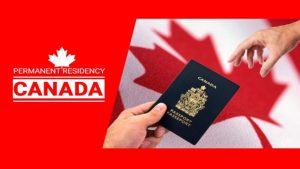A Canadian permanent resident is someone who has been granted permanent resident status by immigrating to Canada.
A permanent resident enjoys many of the same benefits of Canadian citizens. However, unlike citizens, they must maintain their status by meeting certain requirements like the residency obligation.
Express Entry
Express Entry is an online system used by the Canadian government to organize and process applications for skilled workers who wish to immigrate to Canada and acquire Canadian permanent residence status.
Steps:
The first step is to submit your profile which requires the following documents:
- Language test results
- Educational credential assessment report
- A passport or travel document
Secondly, based on your profile, you will receive a score and become part of the pool of candidates who have created their Express Entry profile. After you receive your score and join the candidate pool, it’s essential to regularly update your information and seek opportunities to enhance your score, thus improving your chances of receiving and invitation.
And finally, if you are chosen, you will be issued an invitation to apply for Canadian permanent residence. To complete this application, you’ll need to submit a more comprehensive set of documents that support the information you provided. This includes reference letters, additional identity documents, police clearance certificates, and the results of a medical examination.
Provisional Nomination Program (PNP)
This program differ by Provinces. There are also many Provincial Nominee Programs that do not require a job offer to apply.
Some provinces, such as Saskatchewan, will instead use Expression of Interest (EOI) points-based systems – similar to Express Entry – to determine which candidates will be invited to apply for nomination.
Other provinces, such as Ontario or Nova Scotia, will invite candidates directly from the Express Entry pool to fill specific demographic or labour market gaps. That means, just by having an Express Entry profile in the pool of candidates, you have the opportunity to be invited to settle permanently in a Canadian province.
So if you want to immigrate to Canada and do not yet have a valid job offer, don’t panic! There are many options available to become a permanent resident do not include a job offer requirement.
Steps:
- Application for a PNP and when nominated
- Apply for your PR
- Make first Payment
- IELTS and WES (world educational services) score
Benefits of Canadian PR status Provisional Nomination Program (PNP)
Here are 5 of the major benefits you’ll experience once you become a Canadian permanent resident:
1 – The ability to live and work anywhere in Canada
Canadian permanent residents have the legal right to live and work anywhere in the country. If a new PR starts off in Montreal but finds a better job in Toronto, they will have every right to move. Permanent residents aren’t tied to a specific employer or province.
Additionally, Canadian permanent resident have the ability to leave and enter Canada’s borders using their Canadian permanent resident card, or permanent resident travel documents (PRTD).
2 – Access to universal healthcare and social services
Canadian healthcare is universal, which means access to free medical care. Once an individual becomes a permanent resident, they have access to Canada’s healthcare and social services.
3 – Family sponsorship
Permanent residents can apply to sponsor your spouse, common-law partner, and dependent children to join them in Canada. That said, if you immigrate through Express Entry, you can include your family on your initial application so you won’t have to sponsor them later on.
4 – Free education for children
Children of Canadian permanent residents can study for free up until secondary school. After graduating, post-secondary school is also much cheaper for permanent residents than it is for international students.
5 – Can transition to Canadian citizenship
Becoming a permanent resident is the first step to becoming a Canadian citizen. After residing in Canada for three out of five years, PRs are eligible to become citizens. Once a PR has transitioned to Canadian citizenship, they can vote, apply for a Canadian passport, and no longer need to renew their status in the country.
6 – Protected rights
The rights of Canadian permanent residents are protected under Canadian law and the Canadian Charter of Rights and Freedoms.
Permanent residence cards
Once a person becomes a Canadian permanent resident, they are eligible to apply for a Canadian permanent resident card (PR card). This card indicates a person’s PR status in Canada; permanent residents can use the PR card to travel in and out of the country.
Permanent residence card renewal
Most permanent resident cards are valid for five years, though occasionally PR cards are only valid for one year. The Canadian government encourages permanent residents keep track of their expiration date and apply to renew their Canadian permanent resident card within six months of their card expiring.
Permanent Resident Travel Document (PRTD)
If a permanent resident is outside of Canada and wishes to enter Canada they may apply for a permanent resident travel document (PRTD) if they do not have a valid PR card. The PRTD is usually valid for a single entry to Canada, allowing the permanent resident to enter the country before applying for a PR card, or PR card renewal.
Canadian permanent residency requirements
In order to maintain permanent resident status in Canada, a person must meet a residency obligation. The residency obligation refers to a person’s physical presence inside of Canada for a set amount of time. Canada’s residency obligation for permanent residents requires a person to be physically present inside of Canada for at least 730 days within a five-year period or to fall under one of several exceptions.
Canadian citizenship
Foreign nationals wishing to become Canadian citizens must meet several requirements, including having valid permanent resident status in Canada. In addition, permanent residents wishing to become citizens have different residency obligations than those required for permanent resident status renewal. Consult TD Travel to learn more about becoming a Canadian citizen.
Renouncing permanent resident status
A Canadian permanent resident does not automatically lose their status when their PR card expires. A permanent resident’s status can only be lost through an official process. If a person wants to renounce their permanent resident status, they may submit an application to voluntarily give up their permanent resident status. This may save time during travels if a person knows they have not met their residency obligation and they intend to travel to Canada.
FAQs
Is permanent residence the same as citizenship?
Canadian permanent residents are not citizens of Canada. Canadian permanent residents cannot apply for a Canadian passport, among other benefits enjoyed by citizens. Unlike Canadian citizens, they are also certain requirements a PR must fulfil to keep their status.
Can Canadian permanent residence be revoked?
The Canadian government may revoke permanent resident status for one of the following reasons:
- serious criminality;
- if an individual achieved PR status by means of misrepresentation; or
- they are unable to meet their residency obligations
How long is Canadian permanent residence valid?
Unlike temporary status in Canada, permanent residence status does not expire. If a Canadian PR continues to meet their residency requirements, and the government does not revoke their status, they will continue to maintain their status as a PR.
Can a permanent resident leave Canada?
A permanent resident can leave Canada at any time but must continue to meet their physical presence obligations.
How can I become a Canadian permanent resident?
There are many immigration pathways that will enable a person to become a Canadian permanent resident. For example, permanent residence can be achieved through economic immigration, business immigration, sponsorship, or refugee/humanitarian programs.
Refer to our previous blog posts to see different pathways to Canada.

